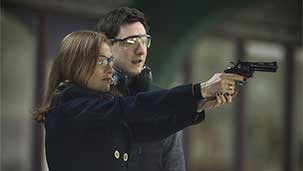Dear Fellow Critics,
Given the dumpster fire of misery and regression that was 2016, you would think my pick for the year’s best film would be something optimistic or uplifting – anything to temporarily forget that we probably won’t be writing about our favourite films of 2017 next year because we’ll have all been accidentally nuked by a blob of talking nacho cheese that likes to throw tantrums on Twitter.
There is one bag of flaming dog shit 2016 left on my doorstep that I’m still not over: watching men who harm women tap dance away from any accountability or consequence. Oddly enough, the media and punditry’s pious lectures on justice, the presumption of innocence, or the ‘proper’ way for sexual assault victims to behave, did not help – too much hysterical rage taking up space in this little ladybrain, perhaps. What has remained stuck in my brain? That you can choke your dinner dates for years and walk away free because their behaviour matters more than yours; that a judge in the 21st century will still openly wonder why a rape victim didn’t just keep her legs together, or worry that prison will ruin a rapist’s athletic career. So for me, the best film of 2016 was one that embraced female anger without trying to assuage it, dismiss it, or scold it, and one that didn’t concern itself with whether or not I felt better or hopeful at the end.
Paul Verhoeven’s Elle opens with the protagonist, Michèle, being raped by an intruder in her home. She is what we are told is a ’perfect‘ rape victim; attacked by a random, masked bogeyman who broke into her house. But then she goes and fucks it all up by not behaving as we are told a rape victim should. She doesn’t curl up into a ball and weep, nor does she seek help. After her intruder leaves, it’s just another evening of tidying up, bath time, and take-out. Michèle approaches the aftermath of her assault with a sense of icy calm, her expression perpetually unreadable, and there is never any explanation offered for her actions, even as they get progressively more twisted.
Calling Elle the angriest film of 2016 might actually be a point of contention. On the surface, it isn’t a very angry film at all. The rape in the opening scene quickly becomes less of a focal point than Michèle’s workplace tensions, family crises, and the mysterious trauma in her past. If anything, she seems to be consumed with glossing over the terrible things that happen to her, and you forget it’s actually a revenge film until right at the end. Michèle gives nothing away. Her anger doesn’t explode in fits of screaming and tears; it simmers away under her cool exterior, occasionally bubbling to the surface with a sarcastic joke or petty, passive-aggressive dig at her family and friends. A good tagline for the film might be, “Michèle doesn’t get mad, she gets even,” but if you look a little closer, you see that she is furious, and it didn’t even begin with her rape; the fury has been building in her for years, but she will get mad (and even) on her own terms. Once you stop being distracted by how she did or didn’t behave after her attack, Michèle’s rage becomes more and more palpable. When she does finally avenge herself, it isn’t in an operatic, Lady-Vengeance-esque way; she acknowledges her triumph with a quick, slight smirk, and that’s it. Those more used to expressing their anger loudly, through poorly rhymed slogans or social media diatribes, might not understand this. Others, whose anger is quieter but every bit as potent, will get it at once. Anyone who has ever swallowed their anger because they simply lack the patience to allay the discomfort angry women seem to provoke, or would just rather not hear, “Hey, hey, calm down, lady,” one more time, will love Michèle for it.
In addition to being the angriest film of 2016, Elle is also relentlessly hostile to its audience, which is kind of perverse, but also pretty cool, in that it offers no explanations or excuses for anything. You are not required to empathize with or relate to Michèle; in fact, she is distinctly unlikeable, and that is exactly why wondering who her rapist is gradually takes a back seat to wondering if Michèle isn’t completely nuts herself. We stop asking, “Who is he? Why did he do this to her?” and focus on, “What the hell is she doing?!” which, at some point, hopefully, will result in a light bulb moment for the viewer.
When it comes to the treatment of sexual assault victims and the perpetuation of rape culture, I doubt I’ll have reason to be less angry in 2017, or any time soon, but Elle served as a kind of catharsis for me, even though there is no moral to the story, no lesson to be learned. I mean, you could tout the film as a reminder that there is no such thing as a perfect victim or something. Or not. Like Michèle, it really doesn’t give a fuck what you think.
Best,

Nat




